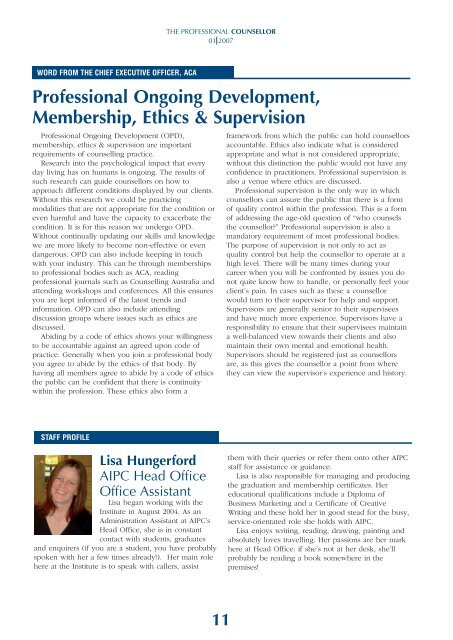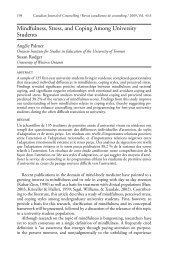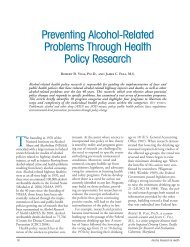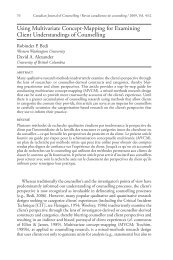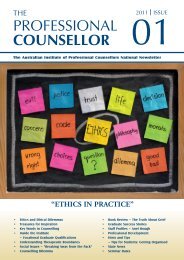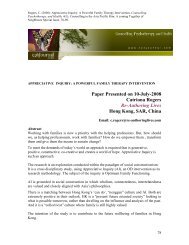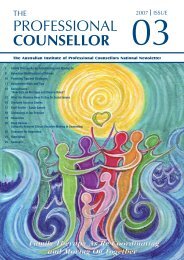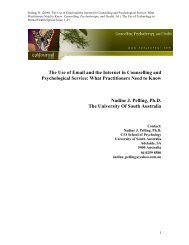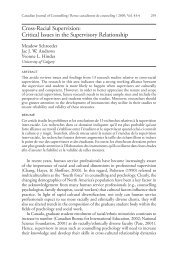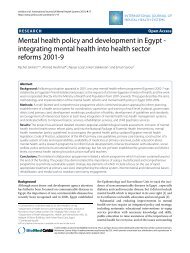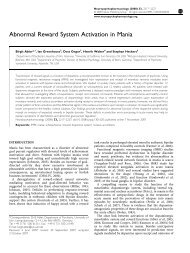PROFESSIONAL COUNSELLOR - Mental Health Academy
PROFESSIONAL COUNSELLOR - Mental Health Academy
PROFESSIONAL COUNSELLOR - Mental Health Academy
Create successful ePaper yourself
Turn your PDF publications into a flip-book with our unique Google optimized e-Paper software.
THE <strong>PROFESSIONAL</strong> <strong>COUNSELLOR</strong><br />
01 2007<br />
WORD FROM THE CHIEF EXECUTIVE OFFICER, ACA<br />
Professional Ongoing Development,<br />
Membership, Ethics & Supervision<br />
Professional Ongoing Development (OPD),<br />
membership, ethics & supervision are important<br />
requirements of counselling practice.<br />
Research into the psychological impact that every<br />
day living has on humans is ongoing. The results of<br />
such research can guide counsellors on how to<br />
approach different conditions displayed by our clients.<br />
Without this research we could be practicing<br />
modalities that are not appropriate for the condition or<br />
even harmful and have the capacity to exacerbate the<br />
condition. It is for this reason we undergo OPD.<br />
Without continually updating our skills and knowledge<br />
we are more likely to become non-effective or even<br />
dangerous. OPD can also include keeping in touch<br />
with your industry. This can be through memberships<br />
to professional bodies such as ACA, reading<br />
professional journals such as Counselling Australia and<br />
attending workshops and conferences. All this ensures<br />
you are kept informed of the latest trends and<br />
information. OPD can also include attending<br />
discussion groups where issues such as ethics are<br />
discussed.<br />
Abiding by a code of ethics shows your willingness<br />
to be accountable against an agreed upon code of<br />
practice. Generally when you join a professional body<br />
you agree to abide by the ethics of that body. By<br />
having all members agree to abide by a code of ethics<br />
the public can be confident that there is continuity<br />
within the profession. These ethics also form a<br />
framework from which the public can hold counsellors<br />
accountable. Ethics also indicate what is considered<br />
appropriate and what is not considered appropriate,<br />
without this distinction the public would not have any<br />
confidence in practitioners. Professional supervision is<br />
also a venue where ethics are discussed.<br />
Professional supervision is the only way in which<br />
counsellors can assure the public that there is a form<br />
of quality control within the profession. This is a form<br />
of addressing the age-old question of “who counsels<br />
the counsellor” Professional supervision is also a<br />
mandatory requirement of most professional bodies.<br />
The purpose of supervision is not only to act as<br />
quality control but help the counsellor to operate at a<br />
high level. There will be many times during your<br />
career when you will be confronted by issues you do<br />
not quite know how to handle, or personally feel your<br />
client’s pain. In cases such as these a counsellor<br />
would turn to their supervisor for help and support.<br />
Supervisors are generally senior to their supervisees<br />
and have much more experience. Supervisors have a<br />
responsibility to ensure that their supervisees maintain<br />
a well-balanced view towards their clients and also<br />
maintain their own mental and emotional health.<br />
Supervisors should be registered just as counsellors<br />
are, as this gives the counsellor a point from where<br />
they can view the supervisor’s experience and history.<br />
STAFF PROFILE<br />
Lisa Hungerford<br />
AIPC Head Office<br />
Office Assistant<br />
Lisa began working with the<br />
Institute in August 2004. As an<br />
Administration Assistant at AIPC’s<br />
Head Office, she is in constant<br />
contact with students, graduates<br />
and enquirers (if you are a student, you have probably<br />
spoken with her a few times already!). Her main role<br />
here at the Institute is to speak with callers, assist<br />
them with their queries or refer them onto other AIPC<br />
staff for assistance or guidance.<br />
Lisa is also responsible for managing and producing<br />
the graduation and membership certificates. Her<br />
educational qualifications include a Diploma of<br />
Business Marketing and a Certificate of Creative<br />
Writing and these hold her in good stead for the busy,<br />
service-orientated role she holds with AIPC.<br />
Lisa enjoys writing, reading, drawing, painting and<br />
absolutely loves travelling. Her passions are her mark<br />
here at Head Office: if she’s not at her desk, she’ll<br />
probably be reading a book somewhere in the<br />
premises!<br />
11


